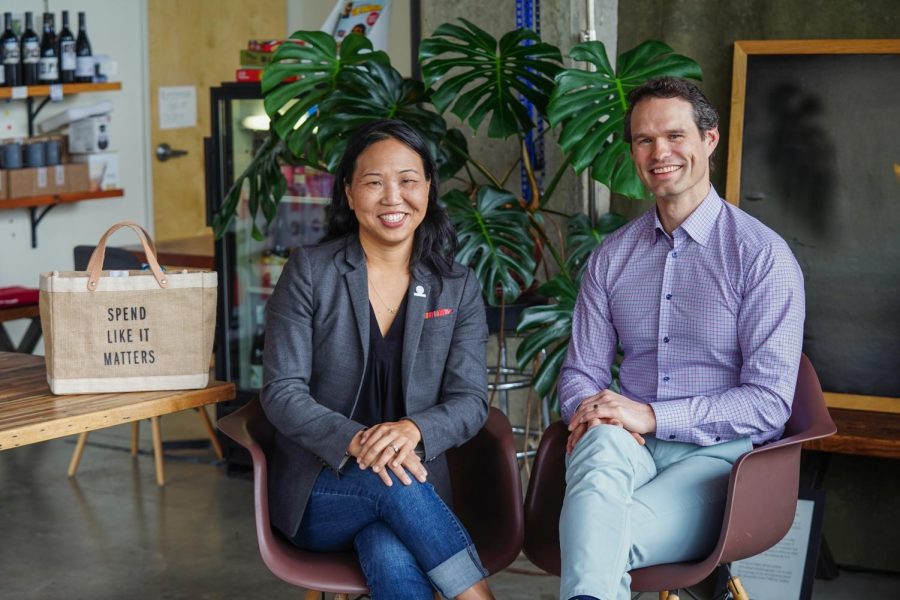Alums Support Small Businesses in a Late-Pandemic Seattle
“When we are intentional about everyday decisions, we can put our thumb on the scales of economic justice,” says Laura Clise ’97, founder of Intentionalist, a company advocating for small businesses and mindful consumption. Markham McIntyre ’00, who has recently transitioned from the Seattle Metropolitan Chamber of Commerce to the city’s Office of Economic Development, brings his experiences in the public sector to their shared passion for economic equity. Since meeting at a Go Green keynote panel in 2017 and later reconnecting over coffee in the Central District, the two have been each other’s sounding boards for blueprinting how to make the Chamber more supportive of people of color and helping Main Street businesses recover from the pandemic.
The pandemic’s effects on the economy have been severe on all fronts, but it has hit small Main Street businesses especially hard. According to data reported by the Downtown Seattle Association, 163 downtown Seattle business locations have permanently closed since the beginning of the first lockdown in spring of 2020. The pandemic has created pathways for most transactions to be performed virtually. With services like Amazon’s single day delivery, shopping can be done online with much less fuss and almost equal speed. Food and groceries can be delivered to your door contact-free at the tap of a finger. Only 33% of office workers have returned as of May 2022. Even if it’s possible for things to revert fully to a 2019 standard of living, it’s not clear that people want them to.
For a long time, Seattle’s steady shift in focus towards attracting tech companies has been a source of much debate—particularly, of course, around Amazon. At least 50,000 people in the region work for Amazon, and the corporation is downtown’s largest private sector employer and largest holder of office space, with its only serious competition coming from colossi such as Facebook and Google. In 2020, 20% of Washington state’s overall economy was made up of tech companies.
Responses to this have been various, from gratitude for the city’s revitalization to fury with how the influx of tech has altered Seattle’s old counter-culture. For his part, McIntyre expresses frustration with the unilateral fist-shaking at large businesses. After all, a functioning ecosystem can benefit from a few larger fish. For example, the success of downtown businesses requires foot traffic. While this has bounced back to a degree—about 70% of pre-pandemic levels—it is also reliant on the attention attracted by large businesses employing workers in and pumping resources into the area. Additionally, the job density brought by these corporations theoretically works to drive up economic growth and productivity and lower costs. However, one source of agreement on all sides seems to be how the introduction of these companies has sent rent prices skyrocketing—and when housing affordability plummets, so too does commercial affordability for small businesses.
As always, most affected of all are the groups most vulnerable to societal prejudice. In Seattle, people of color have struggled most through the pandemic with receiving the kind of federal support they need to recover. The Paycheck Protection Program (PPP) provides necessary relief funds to businesses, but for many businesses owned by people of color and especially Black-owned businesses, there are many more barriers to getting these loans than there are for white-owned businesses with better banking relationships. When it comes to these kinds of inequities, it can be difficult to solve the issue in one fell administrative swoop. As McIntyre says, “It’s not a thing that can happen with just one policy. A lot of it boils down to relationships and exposure and how you’re networking businesses with these different assets or resources.”
This is why Clise takes a less policy-based approach to changing the economic landscape. When it comes to having a meaningful influence, the impact can come from three sides: the government, other companies, and consumers. Clise’s organization, Intentionalist, supports mindful consumption by directing consumers to businesses owned by women, families, and minorities, and connecting these businesses with one another. “As I was thinking about the impact I hoped Intentionalist might have, it was very much about centering the many ways that Main Street small businesses are a part of the solutions to things that were keeping me up at night—whether income inequality, the challenges we face when it comes to bridging cultural and other differences, when it comes to just a general culture of belonging in our city and beyond,” Clise says.
To McIntyre and Clise, the incentives to make the city’s economy more open are ethical and practical; Seattle puts a damper on its own potential by disadvantaging prospective contributors to its growth. “We’ve realized how many obstacles there are for businesses run by people who have been historically marginalized,” McIntyre says. “Coming out of the pandemic, it’s all about opening doors and breaking down barriers.”
Once Tatler’s least prolific writer, Eliot now contents himself with a calling that lends itself better to procrastination. He also co-edits IMAGO, Lakeside’s...

